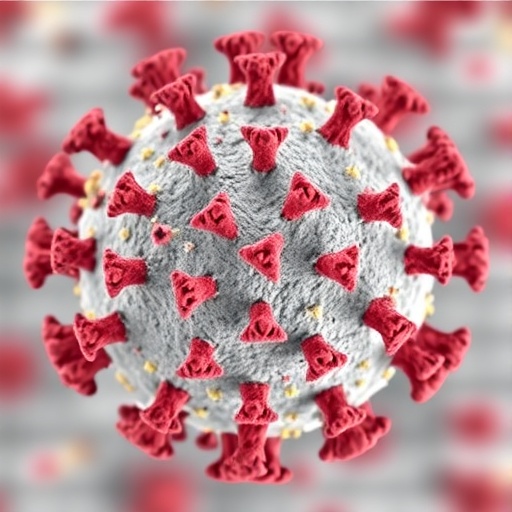In the ongoing global battle against COVID-19, understanding the complexities of the immune response to SARS-CoV-2 remains a pivotal challenge. A groundbreaking study recently published in npj Viruses brings to light the nuanced roles that circulating autoantibodies play in the severity of COVID-19 infections and the effectiveness of viral neutralization. This research not only advances our grasp of immune system behavior in the face of viral intrusion but also sets a foundation for potential prognostic markers and therapeutic targets to manage the disease more effectively.
The study, led by Jacob R.A. and colleagues, meticulously analyzed the presence and diversity of autoantibodies in individuals affected differently by COVID-19, categorizing patients based on hospitalization status and viral neutralization capacity. Autoantibodies, the immune system’s misguided antibodies that attack the body’s own proteins, have been implicated in a variety of autoimmune diseases. Their involvement in infectious diseases, particularly viral infections like COVID-19, however, is an emerging field that this research explores with adept precision.
One of the most striking revelations from this work is the identification of distinct autoantibody profiles that correlate strongly with severe COVID-19 illness necessitating hospitalization. Unlike the typical protective antibodies targeting viral components, these autoantibodies show specificity for human proteins, suggesting that the immune system’s response to SARS-CoV-2 may inadvertently provoke self-directed attacks. The pathological implications of these autoantibodies resonate with clinical observations where severe COVID-19 patients often exhibit inflammatory and autoimmune-like symptoms.
The researchers employed high-throughput immunoassays capable of detecting a broad spectrum of autoantibodies circulating in plasma samples from diverse patient cohorts. This approach allowed for a comprehensive mapping of autoantibody repertoires, revealing not only shared targets but also unique autoantibody signatures strongly associated with disease severity. One notable cluster of autoantibodies correlated with disruption in immune regulation pathways, potentially exacerbating the inflammatory cascade that characterizes critical COVID-19 cases.
Crucially, beyond their association with hospitalization, certain autoantibodies demonstrated a link with the ability to neutralize SARS-CoV-2. This paradoxical finding indicates that while some autoantibodies may contribute to disease severity, others might be implicated in modulating the viral neutralization process, either by interfering positively or negatively with the antiviral immune response. Such dual roles imbue these molecules with both clinical significance and mechanistic intrigue.
The study’s comprehensive data also suggest that autoantibody development could be a consequence of dysregulated immune activation induced by SARS-CoV-2 infection. The virus’s capacity to instigate a hyperinflammatory state, often termed a “cytokine storm,” might create an environment ripe for the breakdown of immune tolerance, leading to the emergence of autoantibodies. This pathological sequence could explain why prolonged or severe disease courses tend to manifest with autoimmune complications.
Furthermore, the therapeutic ramifications are profound. If specific autoantibody profiles reliably indicate heightened risk of severe COVID-19, they could serve as biomarkers to triage patients for intensive monitoring or early intervention. Immunomodulatory treatments could be tailored to attenuate harmful autoantibody production or mitigate their effects. Additionally, understanding the interplay between autoantibodies and neutralizing antibodies might inform vaccine strategies, optimizing immune protection without triggering detrimental autoimmunity.
This investigation also sheds light on the long-term consequences of COVID-19. Post-acute sequelae, often referred to as “long COVID,” reportedly encompass symptoms suggestive of autoimmune dysregulation. The persistence of certain autoantibodies might underpin these chronic manifestations, linking acute viral pathology with prolonged immune dysfunction. Longitudinal studies inspired by these findings are crucial to unravel such complex trajectories.
Intriguingly, the detected autoantibodies target proteins involved in key biological processes such as immune signaling, coagulation pathways, and tissue integrity. Disruption of these functions by autoantibodies could contribute to the multifaceted clinical presentations of COVID-19, from coagulopathy and endothelial damage to neurological involvement. This multifactorial impact underscores the importance of a systems biology perspective in combating the disease.
The methodological rigor of the study is noteworthy. By incorporating control groups including non-infected individuals and mildly affected patients, the researchers ensured that observed autoantibody differences were specific and relevant. Advanced statistical modeling and validation cohorts further bolstered the robustness of the conclusions, establishing strong causal inferences between autoantibody profiles and clinical outcomes.
Beyond the immediate clinical scope, these insights advance the broader immunological understanding of viral infections. Autoimmune sequelae following infections have long been recognized, but delineating their specific contribution to disease course and immunity remains complex. This study offers a blueprint for dissecting these interactions with precision, combining immunology, virology, and clinical science.
Notably, the findings provoke questions for future research: Does vaccination against SARS-CoV-2 influence autoantibody production or modulation? Could therapeutic targeting of autoantibody-producing B cells alleviate severe disease? Are genetic predispositions involved in individual susceptibility to autoantibody generation during infection? These avenues promise fertile ground for scientific exploration.
As the pandemic evolves, this research exemplifies a key shift from solely combating viral replication to understanding host factors dictating disease phenotypes. Personalizing COVID-19 management by integrating immunoprofiling could revolutionize patient care, moving toward precision medicine in infectious diseases.
In sum, the work by Jacob and collaborators paints a complex but enlightening portrait of how our immune systems, while fighting a formidable viral foe, may inadvertently harm the very host they are designed to protect. The revelation of distinct circulating autoantibodies associated with COVID-19 hospitalization and viral neutralization is a testament to scientific ingenuity and a clarion call for continued investigation into the immunopathology of SARS-CoV-2.
Subject of Research:
The study investigates the presence and roles of circulating autoantibodies in relation to COVID-19 hospitalization severity and SARS-CoV-2 neutralization activity.
Article Title:
Distinct circulating autoantibodies are associated with COVID-19 hospitalization and SARS-CoV-2 neutralization activity.
Article References:
Jacob, R.A., Ajoge, H.O., D’Agostino, M.R. et al. Distinct circulating autoantibodies are associated with COVID-19 hospitalization and SARS-CoV-2 neutralization activity. npj Viruses 3, 64 (2025). https://doi.org/10.1038/s44298-025-00149-2
Image Credits:
AI Generated




